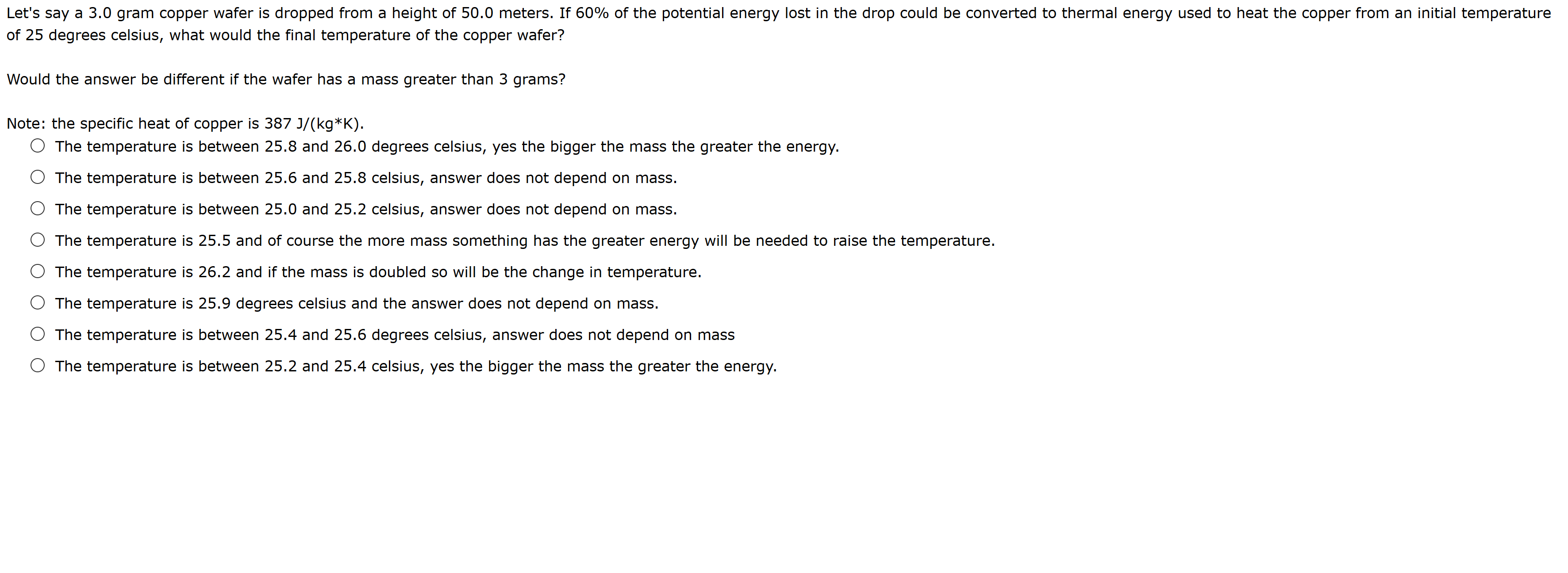Let's say a 3.0 gram copper wafer is dropped from a height of 50.0 meters. If 60% of the potential energy lost in the drop could be converted to thermal energy used to heat the copper from an initial temperature of 25 degrees celsius, what would the final temperature of the copper wafer? Would the answer be different if the wafer has a mass greater than 3 grams? Note: the specific heat of copper is 387 J/(kg*K). The temperature is between 25.8 and 26.0 degrees celsius, yes the bigger the mass the greater the energy. O The temperature is between 25.6 and 25.8 celsius, answer does not depend on mass. O The temperature is between 25.0 and 25.2 celsius, answer does not depend on mass. O The temperature is 25.5 and of course the more mass something has the greater energy will be needed to raise the temperature. The temperature is 26.2 and if the mass is doubled so will be the change in temperature. O The temperature is 25.9 degrees celsius and the answer does not depend on mass. O The temperature is between 25.4 and 25.6 degrees celsius, answer does not depend on mass O The temperature is between 25.2 and 25.4 celsius, yes the bigger the mass the greater the energy.
Let's say a 3.0 gram copper wafer is dropped from a height of 50.0 meters. If 60% of the potential energy lost in the drop could be converted to thermal energy used to heat the copper from an initial temperature of 25 degrees celsius, what would the final temperature of the copper wafer? Would the answer be different if the wafer has a mass greater than 3 grams? Note: the specific heat of copper is 387 J/(kg*K). The temperature is between 25.8 and 26.0 degrees celsius, yes the bigger the mass the greater the energy. O The temperature is between 25.6 and 25.8 celsius, answer does not depend on mass. O The temperature is between 25.0 and 25.2 celsius, answer does not depend on mass. O The temperature is 25.5 and of course the more mass something has the greater energy will be needed to raise the temperature. The temperature is 26.2 and if the mass is doubled so will be the change in temperature. O The temperature is 25.9 degrees celsius and the answer does not depend on mass. O The temperature is between 25.4 and 25.6 degrees celsius, answer does not depend on mass O The temperature is between 25.2 and 25.4 celsius, yes the bigger the mass the greater the energy.
Principles of Heat Transfer (Activate Learning with these NEW titles from Engineering!)
8th Edition
ISBN:9781305387102
Author:Kreith, Frank; Manglik, Raj M.
Publisher:Kreith, Frank; Manglik, Raj M.
Chapter8: Natural Convection
Section: Chapter Questions
Problem 8.9P
Related questions
Question

Transcribed Image Text:Let's say a 3.0 gram copper wafer is dropped from a height of 50.0 meters. If 60% of the potential energy lost in the drop could be converted to thermal energy used to heat the copper from an initial temperature
of 25 degrees celsius, what would the final temperature of the copper wafer?
Would the answer be different if the wafer has a mass greater than 3 grams?
Note: the specific heat of copper is 387 J/(kg*K).
The temperature is between 25.8 and 26.0 degrees celsius, yes the bigger the mass the greater the energy.
O The temperature is between 25.6 and 25.8 celsius, answer does not depend on mass.
O The temperature is between 25.0 and 25.2 celsius, answer does not depend on mass.
O The temperature is 25.5 and of course the more mass something has the greater energy will be needed to raise the temperature.
The temperature is 26.2 and if the mass is doubled so will be the change in temperature.
O The temperature is 25.9 degrees celsius and the answer does not depend on mass.
O The temperature is between 25.4 and 25.6 degrees celsius, answer does not depend on mass
O The temperature is between 25.2 and 25.4 celsius, yes the bigger the mass the greater the energy.
Expert Solution
This question has been solved!
Explore an expertly crafted, step-by-step solution for a thorough understanding of key concepts.
This is a popular solution!
Trending now
This is a popular solution!
Step by step
Solved in 2 steps with 2 images

Knowledge Booster
Learn more about
Need a deep-dive on the concept behind this application? Look no further. Learn more about this topic, mechanical-engineering and related others by exploring similar questions and additional content below.Recommended textbooks for you

Principles of Heat Transfer (Activate Learning wi…
Mechanical Engineering
ISBN:
9781305387102
Author:
Kreith, Frank; Manglik, Raj M.
Publisher:
Cengage Learning

Principles of Heat Transfer (Activate Learning wi…
Mechanical Engineering
ISBN:
9781305387102
Author:
Kreith, Frank; Manglik, Raj M.
Publisher:
Cengage Learning